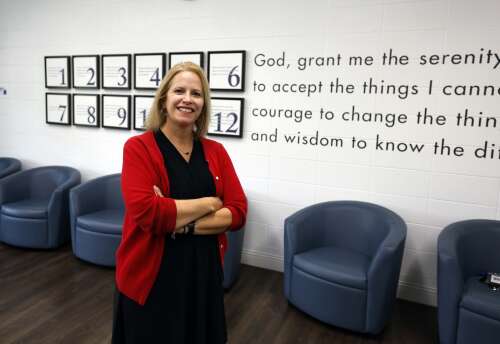The road to recovery from substance use disorder will never be easy. But experts agree greater awareness and increased development of treatment options has made the outlook more hopeful.
The Substance Abuse and Mental Health Services Administration (SAMHSA) began observing September as National Recovery Month to promote and support new evidence-based treatment and recovery practices. That includes more providers offering 24-hour intake service.
Last year, SAMHSA issued the results of a 2021 survey that found 70 million adults perceived they had a substance use and/or mental health problem, with more than 50 million considering themselves to be in recovery or having recovered.
For those in need of recovery, treatment is available through an array of providers like Recovery Centers of America, located near St. Charles.
“We do admissions 24 hours a day, seven days a week, holidays, evenings, overnight, weekends. Anytime that people need help, we’ll be here to do admissions,” said CEO Karen Wolownik Albert, a social worker with more than 25 years of experience in behavioral health.
RCA wants to be a neighborhood provider, allowing families to visit and connect patients back to resources in their home communities. The majority of clients are from within a 100-mile radius.
Recovery Centers of America near St. Charles offers intake services for clients 24 hours a day every day of the year, officials said.
Brian Hill/bhill@dailyherald.com
The facility has connections with a variety of support agencies. They include substance use task forces in various counties, and local authorities that include first responders, hospitals and behavioral health providers.
RCA also has advocates in the community to help get patients into treatment.
“So, if someone comes into an emergency room at two o’clock in the morning in Aurora, that social worker or that nurse at an Aurora hospital knows where resources are available and how to get someone into treatment quickly,” Wolownik Albert said.
The facility has an inpatient staff of 150, with 15 at an outpatient clinic in St. Charles. It has served more than 5,000 people since opening in September 2020, with most patients staying about three to four weeks.
At any given time, the facility has 90 to 100 patients in treatment, with thousands more in its alumni association.
At least one alum, a man who asked to only be identified as Matt, has returned to join the center’s staff.
“I just had been drinking for a really long time and went out one night,” the 35-year-old North Aurora resident said. “I don’t even know what hit me, but I went home and told my mom that I was an alcoholic and that I needed help, and she actually called RCA to get me in.”
He said it had been a problem since he was 18 and had led to his losing two jobs.
Now, he is a recovery support specialist at RCA and is in school with the goal of becoming a therapist.
The facility offers a full continuum of care from detox to outpatient treatment. It also treats co-occurring mental health issues like depression, trauma and anxiety.
“We want to meet people where they are,” Wolownik Albert said.
It embraces both 12-step meetings and SMART Recovery, which is a peer support program that differs from the traditional 12-step program. The facility also provides free Narcan and training in its use for opioid overdoses.
RCA officials said drug treatments for opioid and alcohol abuse also are effective. For instance, buprenorphine and naloxone have reduced opioid-related mortality by 50%, officials said.
For alcohol use disorder, three FDA-approved medications have proven effective: Naltrexone, Acamprosate and Disulfiram.
Wolownik Albert said relapse rates are hard to capture.
“Sometimes when we don’t hear from people (and) that’s good news because they don’t need our services again,” she said. “Sometimes when we don’t hear from people, it’s the worst news. Maybe they have had an overdose or accident or something terrible has happened. But we hope people seek treatment again if needed.”
Wolownik Albert said she is seeing progress in treating addiction.
“We need to treat addiction like the chronic disease that it is, similar to heart disease or diabetes or obesity. These are all chronic conditions,” she said.
The post Meeting people where they are; National Recovery Month marks progress in treatment appeared first on Patabook News .

